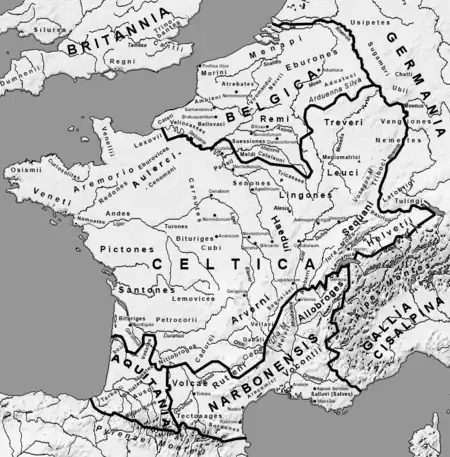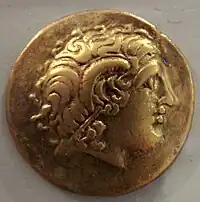The Helvii (also Elui, ancient Greek Ἑλουοί) were a relatively small Celtic polity west of the Rhône river on the northern border of Gallia Narbonensis. Their territory was roughly equivalent to the Vivarais, in the modern French department of Ardèche. Alba Helviorum was their capital, possibly the Alba Augusta mentioned by Ptolemy,[1] and usually identified with modern-day Alba-la-Romaine (earlier Aps). In the 5th century the capital seems to have been moved to Viviers.[2]
From the mid-2nd to mid-1st century BC, Helvian territory was on the northern border of the Roman province of Gallia Transalpina (later the Narbonensis). As a border people, the Helvii played a crucial if limited role in the Gallic Wars under the leadership of Gaius Valerius Caburus, who had held Roman citizenship since 83 BC, and his sons Troucillus and Domnotaurus.[3] Julius Caesar calls the Helvii a civitas,[4] a polity with at least small-scale urban centers (oppida),[5] and not a pagus ("sub-tribe").
Name
They are mentioned as Helviorum (var. iluiorum) by Caesar (mid-1st c. BC),[6] and as E̓louoì (Ἐλουοὶ) by Strabo (early 1st c. AD).[7][8]
Geography

The source of the river Loire (Latin Liger) was located in Helvian territory, near their northern border along the crest of the Cévennes, where their lands were contiguous with those of the Gabali and the Vellavii; to the east, the Rhône offers a natural boundary, despite some indications that their holdings extended across the river.
The ridge between the rivers Ardèche and Cèze was likely their southern border, delimiting their territory from that of the Volcae Arecomici, though it is also possible that the Ardèche itself served this purpose. To the northeast, they were neighbors to the Segovellauni, separated perhaps by a ridge between the rivers Eyrieux and the Ouvèze.[9]
Roman politics
In the 70s BC, following the civil war between the faction of Sulla and the remnants of the supporters of Marius and Cinna, the Roman general Quintus Sertorius refused to yield Spain to the Sullan dictatorship. His secession sparked the Sertorian War, during which Celtic polities in Mediterranean Gaul were subjected to troop levies and forced requisitions to support the military efforts of Metellus Pius, Pompeius Magnus ("Pompey the Great"), and other Roman commanders against the rebels. Some Celts, including perhaps the Helvii and Volcae Arecomici, supported Sertorius. After the renegade Roman was assassinated, Metellus and Pompeius were able to declare a victory, and the Helvii and Volcae were forced to cede a portion of their lands to the Greek city-state Massilia (present-day Marseilles), a loyal independent ally of Rome for centuries, located strategically at the mouth of the river Rhône and the staunch supporter of Pompeius.[10]
.jpg.webp)
During Caesar's Gallic Wars, none of the Gallic civitates within the Narbonese province joined the pan-Gallic rebellion of 52 BC, nor engaged in any reported acts of hostility against Roman forces. The Helvian Valerii, in fact, play a key role in securing Caesar's rear militarily against Vercingetorix, who sent forces to invade Helvian territory.[11] In his 1861 history of the Vivarais,[12] Abbé Rouchier conjectured that Caesar, seeing the strategic utility of Helvian territory on the border of the Roman province along a main route into central Gaul, cultivated the Valerii by redressing the punitive measures taken against them by Pompeius. Caesar mentions the land forfeiture in his Bellum Civile, while discreetly omitting any actions taken by his loyal Helvian friends against Rome in the 70s.
During the Roman civil wars of the 40s, Massilia chose to maintain its longstanding relationship with Pompeius even in isolation, as the Gallic polities of the Narbonensis continued to support Caesar.[13] The Massiliots were besieged and defeated by Caesar, and as a result lost their independence, as well as the land, Caesar implies, that they had taken from the Helvii.[14]
During his dictatorship, Caesar was criticized by political rivals for what were perceived as overly generous grants of citizenship to the Gauls and for admitting even "trouser-wearing Gauls"[15] to the Roman senate. These new Gallic senators were most likely from Cisalpine Gaul (northern Italy), which had become so Romanized that after 42 BC it was no longer assigned as a province and was administered by the same forms of municipal government as the rest of the Italian peninsula[16] (see Annexing Cisalpine Gaul). Ronald Syme, however, pointed out that a few Narbonese Gauls are known to have been highly educated, second-generation Roman citizens who were eminently qualified for senatorial rank. Among those named by Syme were the Helvian Gaius Valerius Troucillus.[17]
See also
References
- ↑ Alba was a common town-name in Latin antiquity.
- ↑ A.L.F. Rivet, Gallia Narbonensis (London 1988), p. 183.
- ↑ Julius Caesar, Commentarii de Bello Gallico 1.19, 1.47, 1.53, 7.8, 7.65.
- ↑ Bellum Gallicum 7.65.2.
- ↑ John Koch notes that the Gallo-Brittonic word corresponding to Caesar's usage of civitas is most likely *touta (Old Irish túath): "'tribe' would not be a perfect translation, but is less misleading than 'state,' 'city,' or 'nation'" (Celtic Culture: A Historical Encyclopedia (ABC-Clio, 2000), p. 450 online. John Drinkwater, however, argues in Roman Gaul: The Three Provinces, 58 BC–AD 260 (Cornell University Press, 1983), for "'nation' in the American Indian sense, made up of a number of tribes — Caesar's pagi" (p. 30, note 2; concept of civitas discussed in depth pp. 103–111). See also A.N. Sherwin-White on civitas, populus, municipium and oppidum in The Roman Citizenship (Oxford University Press, 1973) passim; if *touta is correctly translated as "a people," the sense of civitas Helviorum might be analogous to that of the Roman People (populus) as a political entity. In his edition of Tacitus' Germania (Oxford University Press, 1999), J.B. Rives, drawing on Cicero's definition of civitas as "an assembly and gathering of men associated under law" (Republic 6.13), says that it is the usual word for a "community viewed under its political aspect," equivalent to the Greek polis (p. 153). Further discussion by Olivier Büchsenschütz, "The Significance of Major Settlements in European Iron Age Society," in Celtic Chiefdom, Celtic State (Cambridge University Press, 1995), pp. 53–64; consideration of the term "proto-state" by Patrice Brun, "From Chiefdom to State Organization," in Celtic Chiefdom, Celtic State p. 7; see also Greg Woolf, "Urbanizing the Gauls," in Becoming Roman: The Origins of Provincial Civilization in Gaul (Cambridge University Press, 1998), pp. 106–141. In Gods, Temples, and Ritual Practices: The Transformation of Religious Ideas and Values in Roman Gaul (Amsterdam University Press, 1998), Ton Derks views the civitates of the Augustan era as "city-states": "a civitas was a community, whose constitution was shaped after the Roman example and whose social and political life was centred on a single town" (p. 39 online).
- ↑ Caesar. Commentarii de Bello Gallico, 1:35:4.
- ↑ Strabo. Geōgraphiká, 4:2:2.
- ↑ Falileyev 2010, s.v. Helvii.
- ↑ Rivet, Gallia Narbonensis p. 184.
- ↑ Julius Caesar, Commentarii de Bello Civili 1.35.
- ↑ Caesar, Bellum Gallicum 7
- ↑ L'Abbé Rouchier, "L'Helvie à l'époque gauloise et sous la domination romaine," in Histoire religieuse, civile et politique du Vivarais (Paris, 1861), vol. 1, pp. 3–65.
- ↑ Stéphane Mauné, "La centuriation de Béziers B et l'occupation du sol de la vallée de l'Hérault au Ie av. J.-C.," in Histoire, espaces et marges de l'Antiquité: Hommages à Monique Clavel Lévêque (Presses Universitaires Franc-Comtoises, 2003), vol. 2, p. 73 online.
- ↑ Rouchier, pp. 48–49.
- ↑ It is sometimes assumed that this "accusation" was exaggerated for effect. Suetonius, Divus Iulius 80.2, records the invective chant at Caesar's triumph: "Caesar led the Gauls in triumph and likewise into the senate house; the Gauls took off their trousers and put on the wide stripe" (Gallos Caesar in triumphum ducit, idem in curiam / Galli bracas deposuerunt, latum clavum sumpserunt).
- ↑ Werner Eck, "Provincial Administration and Finance," in The Cambridge Ancient History (Cambridge University Press, 2000), vol. 11, p. 345 online.
- ↑ Ronald Syme, The Roman Revolution (Oxford University Press, 1939, reprinted 2002), p. 79; "The Origins of Cornelius Gallus," p. 43. Syme also takes note of the Vocontian family of the Augustan historian Gnaeus Pompeius Trogus.
Bibliography
- Barruol, Guy (1969). Les Peuples préromains du Sud-Est de la Gaule: étude de géographie historique. E. de Boccard. OCLC 3279201.
- Falileyev, Alexander (2010). Dictionary of Continental Celtic Place-names: A Celtic Companion to the Barrington Atlas of the Greek and Roman World. CMCS. ISBN 978-0955718236.
- Rivet, A. L. F. (1988). Gallia Narbonensis: With a Chapter on Alpes Maritimae : Southern France in Roman Times. Batsford. ISBN 978-0-7134-5860-2.
- Talbert, Richard J. A. (2000). Barrington Atlas of the Greek and Roman World. Princeton University Press. ISBN 978-0691031699.
